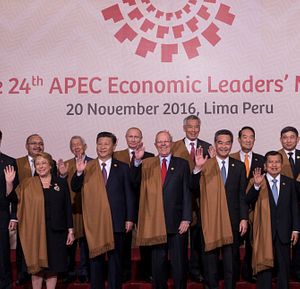This past Saturday and Sunday, the 21 member states of the Asia-Pacific Economic Cooperation forum met in Lima, Peru. With Donald Trump’s unexpected victory in the United States on a platform that largely condemned free trade — APEC’s very raison d’être — this wasn’t the summit these leaders had expected. For outgoing U.S. President Barack Obama, reassuring APEC members of economic continuity in the Pacific Rim was no easy task. Indeed, the Trans-Pacific Partnership, the 12-member trade deal that has become a signature of the Obama administration’s “rebalance to Asia,” is all but dead with Trump’s victory. Trump’s economic populism means that the treaty will very likely not be ratified by the United States.
It would be understandable if, given the turn of events since November 8 in the United States, APEC leaders met in Lima with a sense of pessimism about the future of trade. Coverage of this weekend’s summit, however, has focused on China’s substitutive role as the United States appears to pull back from the world with Trump’s election. The Financial Times noted that “China maneuvers to fill U.S. free-trade role,” while the New York Times, in an article headlined “China’s Influence Grows in Ashes of Trans-Pacific Trade Pact” highlighted the extent to which TPP’s all-but-certain defeat was “an unalloyed triumph for China.”
To stem the tide of pessimism that may have otherwise overtaken the summit, Chinese President Xi Jinping assured APEC member state leaders, both governmental and private sector alike, that Beijing would lean in further on trade. “China will not shut the door to the outside world but will open it even wider,” Xi told business leaders in Lima, without mentioning Trump or the United States. He, of course, didn’t have to. The shock of November 8 still hadn’t worn off as leaders left Lima.
While accounts of China playing point on trade in the Asia-Pacific in the aftermath of Trump’s promised pull-back are correct, Beijing has always had its own plans for expanding regional trade along the Pacific Rim. China’s deals of choice include the Regional Comprehensive Economic Partnership, which excludes the United States but includes other major Asian economies like India (which is not an APEC member), and the Free Trade Area of the Asia-Pacific (FTAAP), an APEC initiative that’s been around in its current form for at least a decade, but has been around as an idea for decades.
Like the TPP, these deals will likely yield positive sum results for their participants once finalized and implemented. Participating states can expect to reap the gains from trade, even if their ostensibly lower standards may not seal in longer term benefits for lower income Asian states (like Vietnam, which is considering participation in both RCEP and FTAAP). TPP, despite originating as a quadrilateral initiative between Singapore, Brunei, New Zealand, and Chile, grew to include strong normative standards built around U.S. norms. Unlike TPP, RCEP, for example, is considerably more tolerant of centrally planned economies with lower labor standards. In some ways, RCEP is more of a traditional “free trade” deal, lowering and eliminating tariffs, but doing little else on standards and non-tariff barriers.
The United States appears all but set now to miss out on Asian and trans-Pacific trade integration that will go on without its involvement. Even the TPP — though unlikely — could be salvaged by its remaining signatories with a modification to the conditions governing its entry into force. For U.S. firms, the effects of missing out won’t be neutral — they’ll be sharply negative, with a loss of relative market access to certain Asian markets to competitors that happen to operate out of RCEP/FTAAP/TPP-1 states.
Trump, meanwhile, declared on Monday evening that he would sign an executive order on his first day in office, putting an end to U.S. participation in the TPP. It remains to be seen if he’ll hold to that spectacular show of resolve against the most complex trade deal ever negotiated, but either way, the United States appears poised to miss out on considerably economic opportunity as it cedes regional economic leadership — and its accompanying benefits — to China.
































